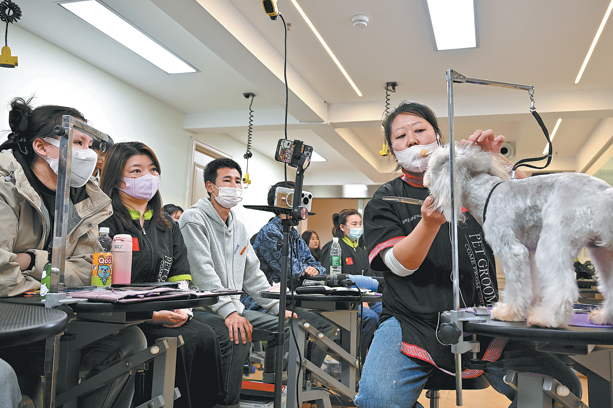Negative list is positive for investments


China's Foreign Investment Law has established a management framework built on pre-entry national treatment and a negative list for foreign investment. Pre-entry national treatment means that foreign investors and their investments enjoy the same treatment given to domestic investors at the stage of market entry. The negative list, meanwhile, identifies specific sectors where foreign investment is restricted or not allowed.
Together these two elements represent the relationship between principle and exception. In principle, China treats foreign investments equally with domestic investments. The exceptions apply only for sectors explicitly listed in the negative list.
This system of pre-entry national treatment plus a negative list was a major policy decision of the CPC Central Committee with Comrade Xi Jinping at its core and marked a significant step in advancing China's high-level opening-up. It is not only a crucial component of China's new system for an open economy, but also a reflection of the government's emphasis on the rule of law.
The Recommendations of the Central Committee of the Communist Party of China for Formulating the 15th Five-Year Plan for Economic and Social Development, issued after the fourth plenary session of the 20th Central Committee of the CPC, propose to shorten the negative list for foreign investment and allow market entities a seamless transition for conducting business through institutional innovation.
The negative list is grounded in the principle that only sectors explicitly designated as prohibited or restricted are off-limits while all others are deemed permissible. By legally delineating the boundaries of public authority, the negative list serves to progressively reduce excessive government intervention through its ongoing refinement. In essence, the negative list uses the rule of law to define the limits of government oversight, thereby enabling the market to play a decisive role in resource allocation.
Before the adoption of the negative list, China employed a positive list system for foreign investment access. Under this framework, the Catalogue for the Guidance of Foreign Investment Industries categorized industries as encouraged, restricted or prohibited for foreign investment.
Since the catalogue only enumerated a finite set of permitted or encouraged sectors, market participants had to operate within constraints. Moreover, the positive list left numerous sectors — particularly emerging business models arising from social and economic evolution — without clear regulatory guidance.
These regulatory gray areas gave significant discretion to government agencies, which often erred on the side of caution and restricted market entry. Such extensive discretionary powers also increased risks of corruption and undermined stable, predictable conditions for investors.
Unlike the exhaustive enumeration of permitted activities under the positive list, the negative list specifies only those sectors that are subject to government regulation. This approach significantly broadens market freedom, reduces regulatory ambiguity, and limits administrative discretion at the investment entry stage.
By drawing a clearer and more transparent boundary between the government and the market, the negative list — applied uniformly nationwide and comprehensive in scope — helps eliminate long-standing regional and hidden market barriers. This greatly improves transparency in investment access, boosts market vitality and allows the government to concentrate on strengthening oversight in sensitive sectors. In doing so, it is able to fulfill its role more effectively.
Beyond those special administrative measures specified in the negative list, China applies the same rules to both domestic and foreign-invested enterprises. This reflects the country's commitment to creating a level playing field for competitors. In such an environment, all market participants, including foreign-invested enterprises, operate under the same regulatory framework without differentiation.
Foreign-invested enterprises are eligible for government policies that support business development, participate equally in standard-setting and compete fairly in government procurement processes.
Establishing a competition-neutral regulatory environment marks a strategic shift for China to transform from policy-driven opening to institutional opening. It helps create a fair competitive landscape for businesses of all types of ownership and further widens China's openness.
The lowering of the barriers to foreign investment allows enterprises to enter sectors based on market demand, fostering full competition. This not only enhances consumer welfare but also drives industrial upgrading and improves production efficiency through competitive pressure.
In a market economy, aligning the activities of market entities with national and public interests remains a key institutional challenge. Foreign investment, due to its cross-border nature, often presents additional complexities.
Before the negative list was adopted, the government could exercise pre-establishment control over market entry. Under the negative list system, however, such front-end control has been substantially reduced. This has necessitated stronger in-process and post-establishment regulatory capacity to ensure that all market players comply with the law.
Internationally, most countries that adopt pre-entry national treatment plus a negative list have well-developed regulatory systems. In this sense, implementing and continually shortening the negative list has itself helped improve China's oversight mechanisms and enforcement capabilities.
In recent years, China has enhanced laws and regulations, reformed regulatory institutions, promoted strict and fair enforcement, strengthened oversight in key sectors and improved the efficiency and fairness of dispute resolution. These efforts have raised compliance awareness among market participants — including foreign investors — and strengthened the government's ability to curb unlawful activities.
This, in turn, has cultivated a more orderly and competitive market while boosting consumer confidence. Spurred by the negative list, these achievements have built a robust foundation for public governance — creating a self-reinforcing cycle of greater openness and vigorous economic competition.
The author is the dean of the Institute of Rule of Law at the China University of Political Science and Law.
The views don't necessarily reflect those of China Daily.
If you have a specific expertise, or would like to share your thought about our stories, then send us your writings at opinion@chinadaily.com.cn, and comment@chinadaily.com.cn.


































